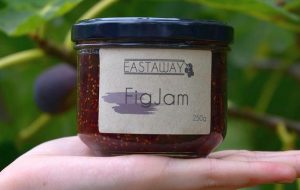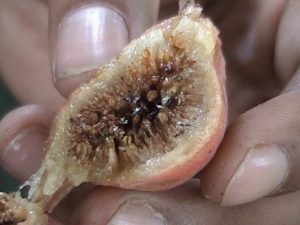A new local food producer – Eastaway Food Products
 Macleod-based Eastaway Food Products are a new startup who make small batch jams, chutneys, cordials and jam drop biscuits. At markets, they also serve fresh sodas (made with the cordials). They choose playful flavour combinations such as saffron & strawberry cordial and plum & rosemary jam. You can buy their products at Eltham Farmers’ Market (on the 1st and 3rd Sundays), Kingsbury Drive Community Market or Warrandyte Riverside Market. Go and talk to them at next Sunday’s Eltham Farmers’ Market! Welcome Larissa and Aaron!
Macleod-based Eastaway Food Products are a new startup who make small batch jams, chutneys, cordials and jam drop biscuits. At markets, they also serve fresh sodas (made with the cordials). They choose playful flavour combinations such as saffron & strawberry cordial and plum & rosemary jam. You can buy their products at Eltham Farmers’ Market (on the 1st and 3rd Sundays), Kingsbury Drive Community Market or Warrandyte Riverside Market. Go and talk to them at next Sunday’s Eltham Farmers’ Market! Welcome Larissa and Aaron!
There are now 10 local makers of jams in the Local Food Directory.
 Eltham Farmers’ Market stallholder schedule
Eltham Farmers’ Market stallholder schedule
As I was manning the information marquee last Sunday, I thought that I would produce a handout of the current stallholder schedule – in other words, which stallholders typically appear on which Sundays. See picture right – it is A4 shape so you can print it off.
News about local food
Delicut Deli, the deli in St Helena, is no more.
Fun facts: figs
 What do you think a fig flower looks like? The answer is that you probably don’t know even though you have probably both seen them and eaten them. How come?
What do you think a fig flower looks like? The answer is that you probably don’t know even though you have probably both seen them and eaten them. How come?
The flowers of a fig tree are actually inside the figs. Indeed, all that squishiness inside of a fig is basically flowers. So, a fig is not a fruit; rather, it is something called a syconium (“an enlarged, fleshy, hollow receptacle with multiple ovaries on the inside surface”).
So, if the flowers of a fig are inaccessible to normal pollinators, such as bees, how do they get pollinated?
If you look closely at a fig, you will see a small hole in the bottom of it. Tiny wasps (called fig wasps) crawl in through those holes and do the pollination.
What happens to the wasps after they have done the pollination?
They die in situ.
And what happens to the bodies of the dead wasps?
You eat them when you eat a fig. All the black dots in the picture are dead fig wasps.
For more information, watch this video.
Yuk!
Luckily for the squeamish, some varieties of fig do not require pollination. And most of the figs bought in shops will be from these varieties. But, at least according to Louis Glowinski in this book The Complete Book of Fruit Growing in Australia, the best tasting figs are from those varieties which do require pollination.
Nerdy aside: it is only the female fig wasps that do the pollination. The wingless male fig wasps are borne, impregnate their sisters, drill little holes in the skin of the fig for their sisters to escape by, and then die. The winged female fig wasps are borne, get impregnated by their brothers, get covered in pollen as they leave through the holes created by their brothers, enter another fig through its base, lay their eggs, and then die. So, whilst a male fig wasp only sees one fig in its life, a female fig wasp sees two.
Which link was clicked most times in the last newsletter?
 The picture of native bee activity in my insect hotel – see picture right.
The picture of native bee activity in my insect hotel – see picture right.
Stop press! At least 7 resin bees (plus a mud wasp) have been working on their holes this week. See the example bottom image in the picture right. All bar 2 of the holes have now been re-plugged. It seems to take a bee around three days, working all day, to go from completely empty hole to plugged hole.
Joke of the week
What happened to the snack bar that was too close to the Synchrotron? They created ‘fission chips’.
New events
No Waste Cook Club
What: This workshop will help you to reduce food waste at home. You will cook a vegetarian lunch together and learn to save money, get creative with veggies, be more adaptable in the kitchen, and learn about the wonders of compost. If you are not able to attend the workshop in the morning, you are welcome to share a free lunch with them afterwards at 1pm.
When: Saturday, 2nd February, 10am-midday.
Where: North Fitzroy Library.
Cost: free.
Bookings: EventBrite.
Further information: LFC calendar entry.
Farm play
What: For families with children aged 2-4. Learn about the life of plants, animals, and their interactions with the environment, cultivating wonder and wisdom from nature play. The activities will vary with the seasons, incorporating sensory play with seeds, leaves, crafts and music, as well as the micro world of mini beasts and soil. Led by Sofia Sabbagh.
When: Every Tuesday from 5th February to 2nd April, each 10am-midday.
Where: Joe’s Market Garden, Coburg.
Cost: $15 per session ($12.50 for 2nd child).
Bookings: just turn up.
Further information: LFC calendar entry.
Bush skills and kids farming
What: For children aged 5-13. Learn about the life of plants, animals, and their interactions with the environment, cultivating wonder and wisdom from nature play. The activities will vary with the seasons, incorporating seed saving, planting, weeding, transplanting, herbal remedies, paint making, puppet making, finding grubs, climbing trees, making shelters, tying knots, spotlighting, bird watching, sensory play, singing and fire-side story telling. Led by Sofia Sabbagh.
When: Every Tuesday from 5th February to 2nd April, each 4-5.30pm.
Where: Joe’s Market Garden, Coburg.
Cost: $15 per session ($12.50 for 2nd child).
Bookings: just turn up.
Further information: LFC calendar entry.
Cook Indian by the creek
What: Menu – daal tadka and spiced rice.
When: Friday, 8th February, 6-7.30pm.
Where: Diamond Creek.
Cost: $45.
Bookings: by email.
Further information: LFC calendar entry.
Cook Indian by the creek
What: Menu – butter chicken and spiced rice.
When: Friday, 22nd February, 6-7.45pm.
Where: Diamond Creek.
Cost: $45.
Bookings: by email.
Further information: LFC calendar entry.
Cook Indian by the creek – vegan special
What: Menu – aloo gobi and aubergine masala.
When: Friday, 1st March, 6-7.45pm.
Where: Diamond Creek.
Cost: $60.
Bookings: by email.
Further information: LFC calendar entry.
Mozzarella and ricotta cheesemaking workshop
What: What you will learn: how to coagulate milk using acid and rennet; how to stretch and shape mozzarella; and how to make whole milk ricotta. What you will get: recipes and the essential techniques of cheesemaking; a tasting of the cheeses made; notes about the major steps of cheesemaking and resources for quality milk and supplies; and a 20% discount on cheesemaking kits and equipment purchased in conjunction with the workshop. Join Jacqueline Bender as she demystifies the art of making two of Italy’s most beloved cheeses. You will make mozzarella and ricotta from bio-dynamic milk (or organic if unavailable) to be eaten at the conclusion of the class. Ricotta will be made from whole milk (paneer style), which you will roll in home-made dukkah (chopped nuts and spices). Participants will be limited to 8 to maintain an informal interactive format.
When: Sunday, 3rd March, midday-2.30pm.
Where: Bee Sustainable, Brunswick East.
Cost: $98.
Bookings: WeTeachMe.
Further information: LFC calendar entry.
Cook Indian by the creek
What: Menu – chicken vindaloo.
When: Friday, 8th March, 6-7.45pm.
Where: Diamond Creek.
Cost: $50.
Bookings: by email.
Further information: LFC calendar entry.
Sourdough bread workshop
What: What you will learn: ways to create and look after your own Sourdough starter culture, flour to use for the best nutrition and results; ways to knead sticky high hydration dough for a more authentic sourdough loaf, equipment needed to produce a great looking and tasting sourdough tin loaf at home; and ways to bake sourdough bread using a bread tin in a home oven, bread dough looks and feels like at its various stages of preparation and development. What you will get: comprehensive workshop notes; sourdough starter culture; and a discount on a professional quality bread tin. Join Rick of The Life We Want as he demonstrates this age old process and introduces you to the equipment and skills required to get started baking at home. Participants will be limited to 8 to maintain an informal interactive format.
When: Saturday, 9th March, 9-11.30am.
Where: Bee Sustainable, Brunswick East.
Cost: $99.
Bookings: WeTeachMe.
Further information: LFC calendar entry.
Edible weeds
What: What you will learn: do’s and don’ts of fermenting beverages; and the process of fermenting beverages. What you will get: recipes to take home; a jun scoby to take home; and samples in class of all three beverages. Presenter: Monique Miller. You will learn the basics of fermenting kombucha and jun kvass (a relative of kombucha) at home.
When: Monday, 11th March, 10am-midday.
Where: CERES.
Cost: $40.
Bookings: WeTeachMe.
Further information: LFC calendar entry.
Pickle and preserving
What: Presented by Angela Ryan. Learn to preserve seasonal produce by making pickles, relishes and sauces. These techniques are suitable for most fruit and veggies. They will make some on the night for you to taste and maybe even take home a small jar.
When: Tuesday, 12th March, 7-8.30pm.
Where: Hawthorn Community House.
Cost: $25.
Bookings: TryBooking.
Further information: LFC calendar entry.
Cook Indian by the creek – Holi special
What: Menu – snacks(bhajji/pakodas).
When: Friday, 15th March, 6-7.45pm.
Where: Diamond Creek.
Cost: $50.
Bookings: by email.
Further information: LFC calendar entry.
Veggie gardening for beginners
What: What you will learn: how to set up and prepare a vegetable garden; how to select, plant and care for crops; and how to grow veggies in the ground, in raised beds and in pots. Presented by Nicole Griffiths. This class will teach you everything you need to know to grow delicious produce in your own backyard. They will cover all of the veggie gardening basics, from setting up your patch to harvesting.
When: Saturday, 16th March, 9.30am-12.30pm.
Where: Bulleen Art and Garden.
Cost: $55.
Bookings: WeTeachMe.
Further information: LFC calendar entry.
Summary of upcoming events
Over the next week
- Become a junior chocolatier: Wednesday, 16th January, 45 minute sessions starting at 9am, 10am, 11am, midday, 1.30pm and 2.30pm.
- Cook Indian by the creek: Thursday, 17th January, 5.30-7.15pm.
- Guided tours of The Plummery: Saturday, 19th January, 10-11am.
- Guided tours of The Plummery: Saturday, 19th January, midday-1pm.
- Best of 2018 masterclass: Saturday, 19th January, 12.30-2.30pm.
- Guided tours of The Plummery: Saturday, 19th January, 2-3pm.
- Murundaka Cohousing Community’s garden: Sunday, 20th January, 10-11am.
- Spoke and Spade – guided tour: Sunday, 20th January, 10-11am.
- Local Sustainability Fair (Ringwood): Sunday, 20th January, 10am-1pm.
- Spoke and Spade – guided tour: Sunday, 20th January, midday-1pm.
- The Beet Retreat – healthy vegan cooking class (4 hour; gluten free): Sunday, 20th January, midday-4pm.
- Spoke and Spade – guided tour: Sunday, 20th January, 2-3pm.
- Cook Indian by the creek: Monday, 21st January, 5-7pm.
- Become a junior chocolatier: Tuesday, 22nd January, 45 minute sessions starting at 9am, 10am, 11am, midday, 1.30pm and 2.30pm.
- Become a junior chocolatier: Wednesday, 23rd January, 45 minute sessions starting at 9am, 10am, 11am, midday, 1.30pm and 2.30pm.
- Emma Grace – beeswax wraps: Wednesday, 23rd January, 10am-midday.
Over the next month
- The Beet Retreat – healthy vegan cooking class (gluten free): Thursday, 24th January, 6.30-8.30pm.
- The Beet Retreat – healthy vegan cooking class (gluten free): Thursday, 31st January, 6.30-8.30pm.
- Clifton Hill rental productive garden: Saturday, 2nd February, 10-11am.
- Northcote rental productive paradise: Saturday, 2nd February, 10-11am.
- No Waste Cook Club: Saturday, 2nd February, 10am-midday.
- festival21 – starting young (kids program): Saturday, 2nd February, 11am-12.30pm.
- Clifton Hill rental productive garden: Saturday, 2nd February, midday-1pm.
- Northcote rental productive paradise: Saturday, 2nd February, midday-1pm.
- festival21 – what should I eat?: Saturday, 2nd February, 1pm-2.30pm.
- festival21 – navigating food landscapes: Saturday, 2nd February, 3pm-4.30pm.
- festival21 – can we eat our way out?: Saturday, 2nd February, 5pm-6.30pm.
- festival21 – the food chain: Saturday, 2nd February, 7-10.30pm.
- Fruit for your backyard workshop: Sunday, 3rd February, 10-11am.
- The Beet Retreat – eating vegan on a budget (4 hour): Sunday, 3rd February, midday-4pm.
- Summer fruit tree training workshop: Sunday, 3rd February, 1-2pm.
- Farm play: Tuesday, 5th February, 10am-midday.
- Bush skills and kids farming: Tuesday, 5th February, 4-5.30pm.
- The Beet Retreat – healthy meals on a budget: Thursday, 7th February, 6.30-8.30pm.
- The art of espalier: Thursday, 7th February, 6.30-9pm.
- Cooking for the Lunar New Year: Thursday, 7th February, 7-8.30pm.
- Indigenous plants for food/fibre/medicine: Thursday, 7th February, 7-8.30pm.
- Cooking master class – all about salads: Thursday, 7th February, 7-9pm.
- Set up and maintain a worm farm: Friday, 8th February, 11am-midday.
- Shio koji making and cooking: Friday, 8th February, 11am-1.30pm.
- Cook Indian by the creek: Friday, 8th February, 6-7.30pm.
- Summer fruit tree pruning: Saturday, 9th February, 9am-1pm.
- Poppy’s patch: Saturday, 9th February, 10-11am.
- Coburg secret garden: Saturday, 9th February, 10-11am.
- Greg’s garden – productive and organic backyard: Saturday, 9th February, 10-11am.
- Bee hive tour: Saturday, 9th February, 10.30am-12.30pm.
- Amazake making and cooking: Saturday, 9th February, 11am-1.30pm.
- Green at Kathleen – preparing for autumn harvest: Saturday, 9th February, 11.30am-1pm.
- Coburg secret garden: Saturday, 9th February, midday-1pm.
- Greg’s garden – productive and organic backyard: Saturday, 9th February, midday-1pm.
- Coburg secret garden: Saturday, 9th February, 2-3pm.
- Greg’s garden – productive and organic backyard: Saturday, 9th February, 2-3pm.
- Farm play: Tuesday, 12th February, 10am-midday.
- Bush skills and kids farming: Tuesday, 12th February, 4-5.30pm.
- Kombucha and gut health: Tuesday, 12th February, 7-8.30pm.
- Food know how – zero waste cooking: Wednesday, 13th February, 6-8pm.
- Summer fruit tree maintenance: Thursday, 14th February, 6.30-9pm.
- Preparing your garden for Autumn harvest: Thursday, 14th February, 7-8.30pm.
- Summer preserves: Saturday, 16th February, 9.30am-12.30pm.
- Attracting native bees: Saturday, 16th February, 10-11.30am.
- Getting started with sourdough: Saturday, 16th February, 10.30-11.30am.
- Composting at home workshop: Saturday, 16th February, 12.30-2pm.
- Home composting workshop: Saturday, 16th February, 2-4.30pm.
